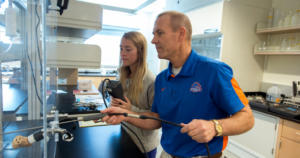The CAES Energy Policy Institute partners with centers, labs and programs across sectors and disciplines.

The Center for Advanced Energy Studies is a research, education, and innovation consortium consisting of the Department of Energy’s Idaho National Laboratory and public research universities in the Inter-mountain West. CAES harnesses the power of collaboration, closely integrating the universities and national laboratory to solve critical energy challenges while providing workforce training opportunities and encouraging economic development in communities throughout the region.
The Directorate of National & Homeland Security, based at Idaho National Laboratory, specializes in critical infrastructure protection, materials armor and advancement, and nuclear non-proliferation.
The Nuclear Directorate at Idaho National Laboratory focuses on advanced nuclear fuel, fuel cycle technologies, nuclear reactor systems, and safety & risk assessment.

The CAES Technical Assessment Program (C-TAP) at Boise State provides fast, innovative solutions to complex technical problem for local and regional businesses. With nationally-recognized expertise in materials science, mechanical and electrical engineering, computer science, biomolecular science, sensor development, geosciences, environmental research and energy, C-TAP provides services at all phases of the product life cycle.

The Industrial Assessment Center (IAC) is a student training/engineering outreach program, based on a partnership between Boise State University and the University of Idaho, funded by the Department of Energy. Each institution helps medium-sized regional industries mainly within 150 miles radius from main campuses to get an in-depth energy audit at no cost to them.
The Energy Systems Technology and Education Center (ESTEC) at Idaho State offers one Basic Technical Certificate, two Intermediate Technical Certificate, and six Associate of Applied Science degrees relating to a growing need for Engineering Technicians in the energy sector.
The Disaster Response Complex (DRC) at Idaho State for research, certification, and training of first responders, in collaboration with the Directorate of National & Homeland Security at CAES and INL, fulfills a need for emergency personnel and advancing the CAES research and education pillars.

The Institute for Pervasive Cybersecurity at Boise State is a leader of innovative cybersecurity research and advancement in Idaho and the region. The Institute facilitates strategic partnerships with industry, higher education, business and government to improve cybersecurity for Idaho and the nation. It also works to commercialize ground-breaking research and tools, and educate graduates to become the change-makers and forward-thinkers of the 21st century.
The Idaho Policy Institute at Boise State serves as an objective research resource for decision makers on topics from COVID 19 response to community housing.
The Earth, Wind and Fire Lab at Boise State broadly studies geomorphic processes and resulting landforms.
The Hazard and Climate Resilience Institute at Boise State fosters whole community collaboration to proactively build resilience to hazards and the impacts of a changing climate.
The Andrus Center for Public Policy at Boise State advances the legacy issues of former Idaho Governor and Secretary of the Interior, Cecil D. Andrus — wise use of our environmental resources and public lands, proper funding of education for our children and the cultivation of leadership from all segments of our society.
The GIS Training and Research Center (GIS TReC) at Idaho State engages in applied science studies of land cover change, particularly wildfire. The GIS TReC’s research program involves both undergraduate and graduate students with a mission to support well informed decisions through geospatial science.

The Cybersecurity Education and Research (CEDAR) Program at University of Wyoming aims to provide centralized resources and communication to university, government, community, and industry partners in matters relating to cybersecurity. The associated CEDAR research lab focuses on the security, resiliency, and privacy within distributed and modern systems (e.g., AI/ML Pipelines, UAV Swarms, Industrial Control Systems).
The Idaho Stem Action Center engineers innovative opportunities for educators, students, communities, and industry to build a competitive Idaho workforce and economy through STEM and computer science education.
The Center for Energy and Environmental Policy Research (CEEPR) at MIT promotes rigorous, objective research for improved decision making in government and the private sector through close cooperation with industry partners.
Research on coal and other industrial communities experiencing structural job transitions brings together expertise from Boise State with MIT, Harvard, and Carnegie Mellon, plus industry and community partners.
The RTOGov Initiative with Duke University, Penn State, Ohio State, and Boise State is a research initiative to evaluate how decisions are made in U.S. electricity markets and whether these governance processes impact real-world outcomes such as price, customer choice, air quality, and innovation.
The Emerging Energy Market Analysis Initiative, led by Idaho National Laboratory (INL), leverages expertise from the University of Wyoming, University of Alaska, University of Michigan, MIT and Boise State to evaluate communities and economies that are undergoing energy transitions.
The Advanced Energy Center (AERTC) in New York focuses on innovative energy research, education and technology deployment with particular emphasis on efficiency, conservation, renewable energy and nanotechnology applications for new and novel sources of energy.
The Institute of Gas Technology (I-GIT) at Stony Brook University supports advanced concepts in gas technology development and deployment for homes and businesses enabling a sustainable and safe environment through cross-disciplinary collaboration and academic-industry.